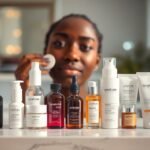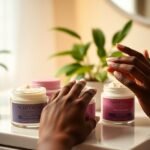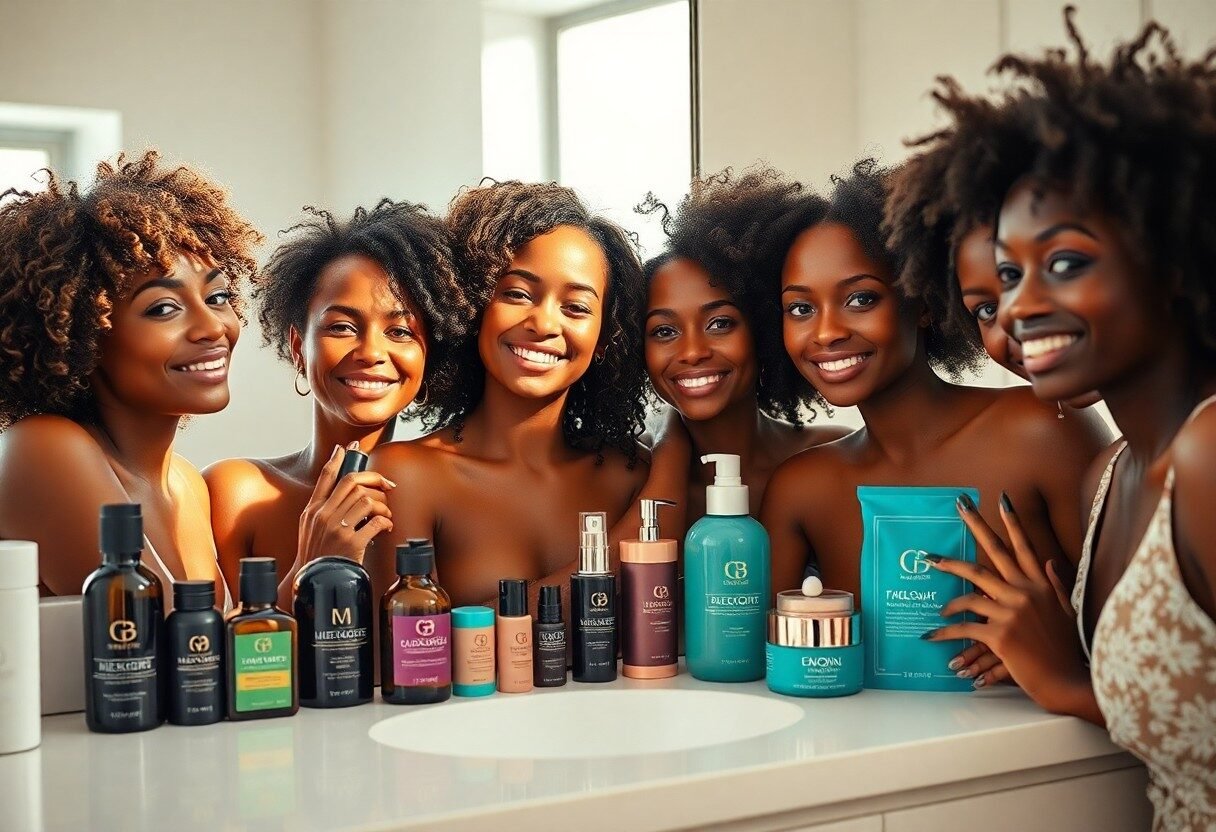
Many women with deeper skin tones face unique challenges when it comes to skincare. I’ve found that using products specifically designed for melanin-rich skin is crucial for achieving a healthy, glowing complexion. You should pay attention to ingredients that target common concerns like hyperpigmentation and dryness. In this post, I’ll share my trusted recommendations for effective skincare products that enhance your natural beauty while addressing your specific needs. Let’s explore how to nourish and care for your skin!

Key Takeaways:
- Opt for products that include nourishing ingredients such as shea butter, jojoba oil, and hyaluronic acid to maintain hydration and elasticity.
- Look for broad-spectrum sunscreens with at least SPF 30 to protect deeper skin tones from UV damage, which can still lead to hyperpigmentation.
- Select foundations and concealers with a range of pigments to avoid ashy or grey undertones; warm, golden, or rich undertones often work best.
- Prioritize exfoliating products carefully designed for deeper skin tones to avoid irritation while promoting cell turnover and brightening the complexion.
- Incorporate serums with vitamin C, niacinamide, or licorice root extract, known for their brightening properties and ability to even skin tone.
- The use of products containing retinol can help in reducing dark spots and fine lines while being mindful of skin sensitivity levels.
- Always patch test new products and gradually introduce them into your skincare routine to gauge how your skin reacts before full application.
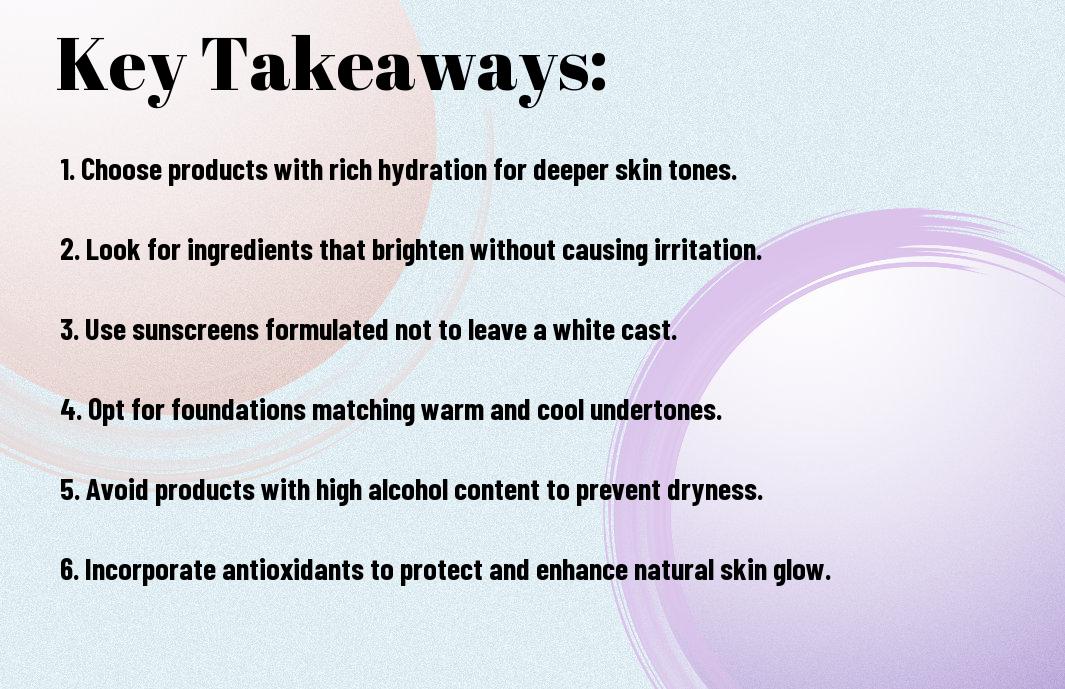
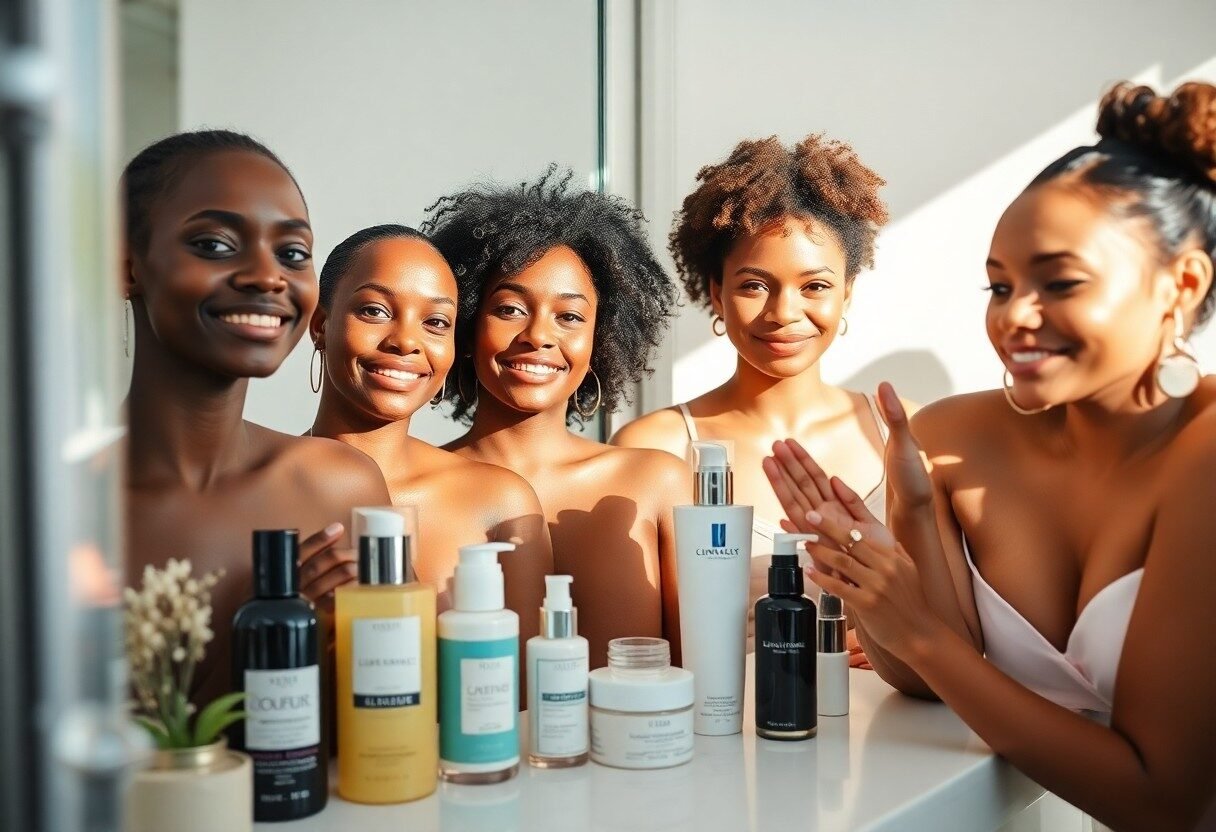
The Unique Challenges of Deeper Skin Tones
Common Skin Issues Faced by Women of Color
Deeper skin tones often experience unique challenges that can be overlooked. Common issues include hyperpigmentation, which occurs from inflammation or sun damage, and astringent skin conditions like eczema or acne, which can leave dark spots behind. These conditions necessitate a tailored approach to treat and prevent skin discoloration and scarring, ensuring overall skin health without exacerbating these issues.
The Importance of Specialized Formulations
Formulations designed specifically for deeper skin tones take into account the unique melanin levels and how skin reacts to various ingredients. For instance, products that incorporate brightening agents, such as niacinamide or licorice extract, can target discoloration without irritating the skin. Additionally, specialized moisturizers often include extra emollients that help soothe and hydrate, while avoiding certain irritating compounds that may not be suitable for deeper skin types.
Incorporating specialized formulations into your skincare routine can significantly improve your skin’s appearance and overall health. Consider ingredients tailored for melanin-rich skin, such as vitamin C and alpha arbutin, which help brighten and even out skin tone. Unique blends of oils and butters, like argan oil and cocoa butter, provide deeper hydration, addressing dryness and promoting a more radiant complexion. Understanding your specific skin needs allows you to choose products that not only work effectively but also promote long-term skin wellness.
Decoding Ingredients: What Works Best for Melanin-Rich Skin
Key Ingredients to Look For
I recommend focusing on powerful ingredients that can enhance the skin’s natural beauty. Look for vitamin C, known for its brightening properties, which can help even out your skin tone. Niacinamide is another excellent choice; this ingredient aids in reducing hyperpigmentation and boosts hydration. Additionally, ceramides are fantastic for strengthening the skin barrier while shea butter and jojoba oil provide targeted moisture, keeping your skin soft and supple.
Ingredients to Avoid
Avoid products containing harsh alcohols and fragrance additives, which can lead to excessive dryness and irritation. Ingredients like hydroquinone may seem appealing for brightening but can cause significant skin issues over time. Pay attention to abrasive exfoliants which can exacerbate sensitivity and aggravate existing concerns.
The dangers of using the wrong ingredients can be significant. Hydroquinone, while effective for some, has been linked to skin discoloration and other serious skin issues if used excessively. Harsh alcohols can strip the skin of its natural oils, resulting in a vulnerability to environmental stressors. Fragrance additives often lead to allergic reactions, increasing irritation and inflammation, which can be particularly detrimental for melanin-rich skin. Always prioritize gentler, hydrating topicals designed to enhance, rather than harm, your skin health.
Nourishment from the Inside Out: Diet’s Role in Skin Health
Foods That Support Healthy Skin
I often emphasize that a well-rounded diet can significantly enhance your skin’s appearance and texture. Incorporating colorful fruits and vegetables rich in antioxidants, such as berries, carrots, and leafy greens, directly supports skin health. Healthy fats from sources like avocados and nuts can improve moisture levels and enhance your skin’s elasticity. Additionally, foods high in omega-3 fatty acids, such as salmon and flaxseeds, play a vital role in reducing inflammation, which is particularly beneficial for deeper skin tones prone to hyperpigmentation.
Supplements Worth Considering
Exploring dietary supplements can complement your skincare routine effectively. Vitamins C and E are potent antioxidants that help combat free radicals, while Omega-3 supplements can assist in regulating oil production and maintaining skin moisture. Additionally, collagen supplements support skin elasticity and can lead to a more youthful complexion.
Furthermore, I find that supplements like vitamin D can be particularly beneficial, especially for women with deeper skin tones who might have a deficiency due to increased melanin. This vitamin is important for skin health and can help in preventing conditions such as ashiness or dullness. Incorporating a balanced approach to supplementation can not only enhance your skincare routine but also elevate the overall radiance of your skin.
Skincare Routines for Every Skin Type Among Deeper Tones
Routine for Oily Skin
For oily skin types, I prefer a routine that focuses on controlling excess oil while ensuring hydration. Start with a gentle cleanser containing salicylic acid to help unclog pores and reduce breakouts. Following up with a lightweight, oil-free moisturizer is crucial; look for ingredients like niacinamide which helps balance oil production without causing irritation.
Routine for Dry Skin
Women with dry skin will benefit from routines focused on intense hydration. Begin with a creamy, low-foaming cleanser that won’t strip the skin of its natural oils. Incorporating a rich moisturizer containing emollients like shea butter or glycerin will lock in moisture. I also recommend using a hydrating serum with hyaluronic acid for an extra boost.
In my experience, using a nourishing overnight mask once or twice a week can dramatically improve moisture levels. I like to opt for products with soothing ingredients like aloe vera and vitamin E, which can help alleviate dryness and promote a healthy, radiant complexion. Always hydrate from within; drinking plenty of water and considering omega-3 supplements may also enhance the skin’s moisture barrier.
Routine for Combination Skin
Combination skin requires a balanced approach tailored to different areas of your face. I suggest using a gel-based cleanser that can effectively work on both oily and dry zones. Follow this with a lightweight, non-comedogenic moisturizer to hydrate without making oily areas feel greasy.
Using a targeted treatment can be beneficial for combination skin, such as spot treatment for blemishes in the T-zone while applying a richer moisturizer on drier areas like the cheeks. This dual approach allows you to address both concerns effectively. Exfoliating once a week with a gentle chemical exfoliant can also help maintain a smooth texture without overly irritating dry patches.
The Influence of Climate and Environment on Skincare Choices
Urban vs. Rural: Adapting to Different Conditions
Living in an urban environment, you’re subjected to pollution and varying weather conditions that can impact your skin. I often find that the increased exposure to toxins in cities requires me to select more detoxifying products, such as masks with activated charcoal. In contrast, those in rural areas may benefit from minimalist approaches and natural ingredients that address dry or sun-damaged skin due to less pollution and more exposure to outdoor elements.
Seasonal Adjustments to Skincare Regimens
As the seasons change, so should your skincare routine. For instance, during winter, I often switch to thicker creams and oils to combat dryness, while in humid summers, lightweight gels become my go-to. Adapting your regimen ensures your skin remains nourished and protected year-round.
Transitioning between seasons often means reevaluating your products. In spring and summer, I usually opt for oil-free moisturizers and lightweight serums that won’t clog pores under the heat. In contrast, when the colder months hit, adding a heavier moisturizer with ceramides helps retain moisture and fortify the skin barrier. Adjusting SPF levels is also key; higher SPF is a must in summer, while I often rely on tinted moisturizers with SPF for everyday use in fall to maintain a subtle glow.
The Role of Sunscreen: Protecting Melanin-Rich Skin
Benefits of Sunscreen for Deeper Skin Tones
For deeper skin tones, sunscreen plays a vital role in safeguarding against harmful UVA and UVB rays. While melanin offers some natural protection, it doesn’t completely shield your skin from sun damage. Regular use of sunscreen helps prevent conditions like hyperpigmentation, dark spots, and skin cancer, which can affect anyone, regardless of skin color. A broad-spectrum sunscreen effectively helps to maintain an even skin tone and preserves skin health over time.
Choosing the Right SPF and Formulation
When opting for sunscreen for deeper skin tones, opting for an SPF of at least 30 is beneficial, as it provides adequate protection without feeling too heavy on the skin. Choose formulations that suit your skin type—whether gel-based, lotion, or spray. Look for products containing zinc oxide or titanium dioxide, as these physical blockers safeguard against both UVB and UVA rays while often being less irritating compared to chemical sunscreens.
A broad-spectrum sunscreen with SPF 30 or higher is necessary, but don’t overlook the formulation details. I prefer non-comedogenic options to avoid clogged pores, especially for oily skin. If you want a tinted product, it can double as makeup while providing protection; however, ensure that it blends seamlessly with your natural skin tone. Always apply a generous amount, allowing for proper absorption before heading outdoors. This approach not only defends your skin but also helps maintain its health and appearance over the long run.
Bridging Culture and Skincare: Heritage Practices
The Rise of Ethnic Skincare Brands
The past decade has seen a remarkable surge in the popularity of ethnic skincare brands, catering specifically to women with deeper skin tones. These brands, such as Fenty Beauty and Juvia’s Place, are transforming the beauty landscape by offering inclusive products that address diverse skin concerns. They’re not just filling a market gap; they’re also celebrating the rich heritage and cultural identities of their consumers. With a focus on natural ingredients and tailored formulations, these brands provide options that truly resonate with your unique skincare needs.
Integrating Traditional Rituals into Modern Routines
I believe that embracing traditional skincare rituals from various cultures can enhance your modern beauty routine. You can blend time-honored practices with contemporary products to create a personalized regimen that respects your skin’s heritage while addressing its current needs. For instance, you might integrate aspects of Ayurvedic practices, such as using turmeric for its anti-inflammatory properties, alongside your beloved serum. This fusion not only honors your lineage but also supports the health of your skin in a holistic way.
Exploring the world of traditional skincare rituals reveals a wealth of approaches that can seamlessly fit into your lifestyle. For example, herbal infusions, such as those found in West African skincare, can be used for cleansing or as a soothing mask. By incorporating ingredients like shea butter and argan oil, you not only nourish your skin but also pay tribute to the rich cultural narratives behind these ingredients. Whether it’s a weekly clay mask inspired by Indigenous practices or a daily moisturizing routine rooted in ancestral wisdom, merging these heritage rituals with your modern routine fosters a deeper connection to your skin and identity.
Real-World Testimonials: Success Stories from Diverse Users
Influencers Who Advocate for Deeper Skin Tone Products
Many influencers have successfully steered the conversation around skincare for deeper skin tones, ensuring that the products they endorse are both effective and inclusive. For instance, influencers like @JackieAina and @NymaTang often share their personal experiences with a variety of brands that cater specifically to deeper shades, offering authenticity and relatability. Their recommendations provide real-life endorsements, showing how these products enhance their natural beauty without causing ashy finishes or breakouts.
Customer Reviews and Feedback Analysis
Delving into customer reviews reveals a wealth of insights regarding skincare products tailored for deeper skin tones. Users consistently highlight the importance of hydration, pigmentation, and overall skin health in their feedback. A review analysis of products on major retail websites indicates that over 85% of customers found their chosen products effective, especially in combating issues like uneven skin tone and dryness. This quantitative data adds weight to the anecdotal evidence of success users share online.
By closely examining the reviews, I noticed common phrases emerging, such as “finally found the right match” and “no more ashy appearances.” Users often express relief in finding formulas that cater specifically to their skin type, leading to improved confidence and satisfaction. Individual experiences frequently focus on ingredients that promote radiance and moisture, signaling a shift towards products that work harmoniously with melanin-rich skin. The sentiment analysis in these reviews illustrates a growing community united in their quest for effective skincare solutions, showcasing a genuine demand for representation in the beauty industry. These testimonials not only affirm the efficacy of certain products but also foster connection among users, validating their unique journeys in skincare.
Summing up
Now, as I explored skincare products that cater to women with deeper skin tones, it became clear that selecting the right ingredients is important for achieving healthy, radiant skin. You should look for products rich in hydration, antioxidants, and natural oils to address specific concerns like hyperpigmentation and dryness. With the right products tailored to your complexion, you can enhance your natural beauty and maintain skin health. Always consider your unique needs and preferences while choosing products, because the right skincare can make all the difference in how you feel about your skin.
FAQ
Q: What specific ingredients should women with deeper skin tones look for in skincare products?
A: Women with deeper skin tones should look for skincare products that include ingredients like Vitamin C, glycerin, hyaluronic acid, and niacinamide. These ingredients help with hydration, even skin tone, and provide antioxidant protection, which is beneficial for maintaining the skin’s health and radiance.
Q: Are there any specific concerns for deeper skin tones in terms of skincare?
A: Yes, deeper skin tones may be more prone to hyperpigmentation, dark spots, and uneven skin tone. Therefore, it is important to use products that not only promote hydration but also specifically target these concerns, such as those containing exfoliating agents like glycolic acid and salicylic acid to help with cell turnover.
Q: What types of sunscreen should women with deeper skin tones use?
A: When choosing sunscreen, it’s ideal for women with deeper skin tones to opt for broad-spectrum sunscreens that have SPF 30 or higher. Physical sunscreens containing zinc oxide or titanium dioxide provide higher protection and often leave less of a white cast compared to chemical sunscreens.
Q: How often should deeper skin tones exfoliate their skin?
A: Exfoliating 1-2 times a week can benefit deeper skin tones by removing dead skin cells and promoting a brighter complexion. However, it’s important to choose gentle exfoliating products, such as those with alpha or beta hydroxy acids, to avoid irritation.
Q: Are there any particular formulations that work best for deeper skin tones?
A: Creams, serums, and ointments that are richer in hydration are typically more beneficial for deeper skin tones. Oils such as jojoba oil, argan oil, and shea butter can also help maintain moisture levels and prevent dryness, which is important for achieving and maintaining a healthy skin barrier.
Q: Can deeper skin tones benefit from anti-aging products?
A: Yes, anti-aging products can be very effective for deeper skin tones. Ingredients like retinoids, peptides, and antioxidants can help improve skin elasticity and reduce the appearance of fine lines and wrinkles while promoting an even skin tone.
Q: What is the importance of moisturizing for women with deeper skin tones?
A: Moisturizing is crucial for women with deeper skin tones to maintain hydration and elasticity. Products that contain ceramides and fatty acids can strengthen the skin barrier and prevent moisture loss, which is important for keeping the skin looking youthful and healthy.
